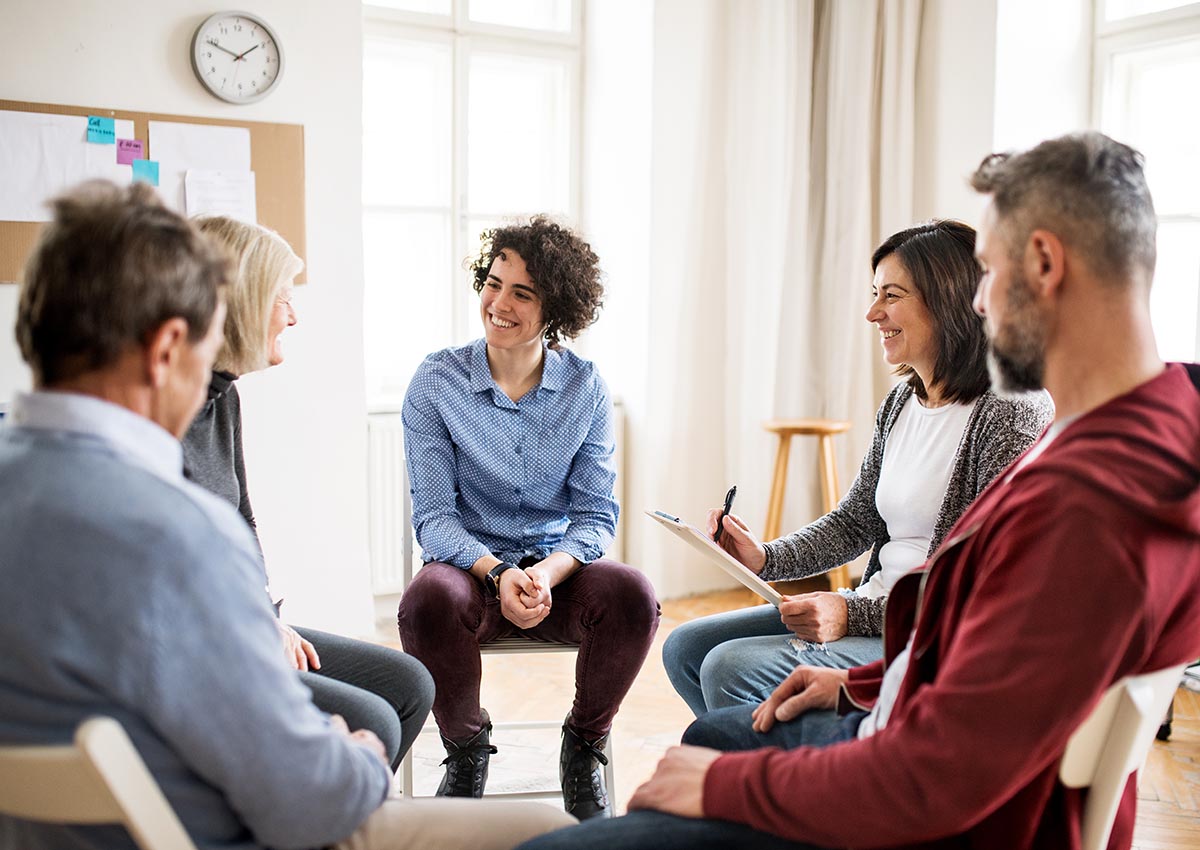Group therapy can help in treating various mental health issues. For those who are proactive in seeking professional help to overcome problems with their mental health, group therapy activities offer a great coping mechanism.
Groups often focus on interpersonal learning and allow participants to work together to help each other through communication inside the group while focusing on understanding issues outside of the group setting. Are you looking for group therapy services in Florida? Contact Gulf Breeze Recovery Center today by calling 833.551.2304 or reaching out to our team online.
What Is Group Therapy?
Group therapy is a type of psychotherapy that involves one or more therapists working with several clients at the same time. However, this is not the same as family therapy; the difference is that family therapy has therapists working with a group of participants who are all related to each other. In group therapy, participants are typically clients struggling with the same mental health disorder. This type of psychotherapy is widely available at a variety of locations by itself or as part of comprehensive programs that also include one-on-one therapy sessions.
The most common types of group therapy include:
- Cognitive-behavioral therapy (CBT) groups — These focus on identifying and changing inaccurate or distorted thinking patterns, emotional responses, and behaviors.
- Interpersonal groups — These focus on interpersonal relationships and social interactions, including how much support clients have from others and the impact these relationships have on their mental health.
- Psychoeducational groups — These focus on educating clients about their disorders and coping methods. Techniques used are also often based on the principles of CBT.
- Skills development groups — These focus on improving social skills in clients struggling with mental disorders or diagnosed with developmental disabilities.
What Are Some Common Group Therapy Activities for Adults?
1. Anything You Can Do
In group therapy, participants have the opportunity to help one another and offer support. Knowing that you’re not alone helps in dealing with day-to-day struggles.
To play this game, you will need materials of achievement — such as past plaques, awards, newspaper articles, or trophies. Have each participant stand up and re-enact whatever caused them to win the particular accolade signified by the material of achievement they’ve brought along. The participant gets to relive times in which they have achieved something great, and others can once again applaud them for the achievement. Reliving these events will allow for an overall feeling of self-worth for each client, as well as self-esteem building.
Clients with high self-esteem achieve higher gratification on outcome measures following completion of therapy. Building self-esteem in group therapy is a way to show compassion and unity.
2. Goal Identification
Often, goal setting is part of group therapy, so games that help with goal identification can be excellent group therapy activities for adults.
To play this game, you will need colored pens and paper. Have each client draw a short-term goal, a middle-term goal, and a long-term goal. All three should be goals or steps leading to a larger goal. One at a time, each participant should show their papers to the group. Other participants attempt to guess the goal and offer comments on how the participant can accomplish it.
The identification of goals lays the framework for future therapy sessions. Commentary from other participants provides insight that clients may not have considered previously and allows for seemingly impossible goals to feel more attainable.
3. In Thee We Trust
Trust is essential in group therapy because participants share deep feelings and personal stories with one another. Trust-building games allow participants to begin to trust each other, especially when used in initial sessions.
To play this game, you’ll need a room free from natural sunlight, two pairs of night vision goggles, and items of affirmation — such as stuffed animals. Divide participants into two teams and give a pair of goggles to the “dictator” of each team. The dictators place items of affirmation in random areas throughout the room. One person from each team attempts to find the item to be determined by their dictator while the others stand in their spots. Have the dictators direct the participants from their team throughout the dark room towards the direction of the items. As soon as one team member finds their item, another person from the same team should start doing the same thing. The game is over when one team retrieves all of the items.
Building trust is effective in group therapy because it helps those who have problems building and maintaining relationships. It works because participants learn to gain trust and possibly establish new relationships with other participants.
4. The Self-Compassion Pause
Compassion is another essential component of group therapy. However, participants are often able to offer compassion to others but unable to do the same for themselves. This activity allows clients to practice self-compassion and mindfulness with the encouragement of other participants.
To play this game, you will need pens and paper. Have each participant sit alone and reflect silently on regrets in their life, writing them down on paper. When reassembled as a group, participants should read aloud to the group their regrets, one at a time. This helps them to recognize what went wrong and why they are living with regret. The group should encourage each participant and help each other understand why self-compassion and forgiveness are necessary. The group should also offer ideas and solutions related to dealing with regret.
The benefit of this activity, when used in group therapy, comes in the form of finding support in others dealing with similar problems and coping together through healthy communication.
Learn More About Gulf Breeze Recovery Center’s Group Therapy Services
If you’re searching for group therapy services in Florida, contact Gulf Breeze Recovery Center today. Call 833.551.2304 or reach out to our team online. We can provide the continued support you need to ensure effective and lasting recovery.







